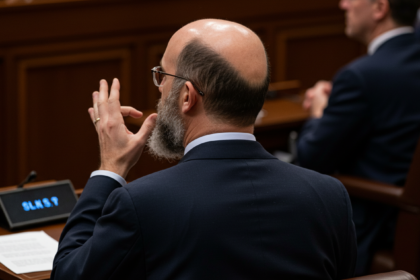Based on available reports, South Carolina has officially dismissed its lawsuit against cryptocurrency exchange Coinbase. The case, which accused Coinbase of offering unregistered securities through its staking services, was dropped following a joint stipulation between Coinbase and the South Carolina Attorney General’s Securities Division.
The decision follows a similar move by Vermont, which also abandoned its legal action against Coinbase. Paul Grewal, Coinbase’s Chief Legal Officer, described the dismissal as a positive development not just for the company but for American crypto users.
“South Carolina just joined Vermont to dismiss its unfounded staking lawsuit against Coinbase,” Grewal wrote in a March 27 post on X. “This is not just a victory for us, but for American consumers, and we hope it’s a sign of things to come in the few states left that restrict staking.”
Coinbase’s Ongoing Legal Battles: A Turning Point for Staking Regulations?
The now-dismissed lawsuit was part of a broader crackdown initiated by multiple states against Coinbase’s staking services. On June 6, 2023, ten U.S. states, including South Carolina and Vermont, reportedly took coordinated legal action against the exchange, mirroring a lawsuit filed by the Securities and Exchange Commission (SEC) on the same day.
While South Carolina and Vermont have stepped away from the case, eight other states, Alabama, California, Illinois, Kentucky, Maryland, New Jersey, Washington, and Wisconsin, continue to pursue enforcement actions against Coinbase.
The SEC, which led the initial charge, reportedly dismissed its own lawsuit against Coinbase on February 27, 2025, following increasing scrutiny over its handling of crypto-related enforcement. South Carolina’s decision to follow Vermont in withdrawing its lawsuit suggests a possible shift in regulatory attitudes toward staking services, a practice where crypto holders earn rewards for helping to secure blockchain networks.

Grewal highlighted the financial losses suffered by South Carolina residents due to the lawsuit, estimating that they lost around $2 million in staking rewards during the period of restriction.
“The 52 million Americans who own crypto deserve commonsense consumer protections and clear rules,” he stated. “We applaud South Carolina for standing up for justice and hope the remaining states with bans on staking will take notice.”
South Carolina’s Shift Toward Crypto Adoption: Bitcoin Reserve Bill Introduced
Beyond dropping its lawsuit against Coinbase, South Carolina is making another major move in the digital asset space. On March 27, 2025, State Representative Jordan Pace introduced the “Strategic Digital Assets Reserve Act of South Carolina,” which seeks to establish a Bitcoin reserve for the state.
House Bill 4256 allows the state treasurer to allocate up to 10% of certain state funds into Bitcoin and other digital assets. Notably, this bill differs from most other state-level crypto reserve initiatives by explicitly naming Bitcoin multiple times as the asset of focus.
If passed, the legislation would authorize South Carolina’s treasurer, Curtis Loftis, to manage a Bitcoin reserve, which could hold up to 1 million BTC. The reserve would support various state investment funds, including the General Fund and the Budget Stabilization Reserve Fund.
Comparing South Carolina’s Approach to Other States and the Federal Government
South Carolina’s proposed Bitcoin reserve aligns with a broader trend of U.S. states exploring digital asset investments. According to Bitcoin Law, 42 Bitcoin reserve bills have been introduced across 19 states, with 36 of them still active. However, South Carolina’s initiative stands out due to its ambitious scale and explicit emphasis on Bitcoin.
The state’s approach mirrors recent federal-level developments. Earlier this month, President Donald Trump signed an executive order establishing a Strategic Bitcoin Reserve and a Digital Asset Stockpile. Unlike South Carolina’s bill, the federal initiative is funded through cryptocurrency seized in government criminal cases.
Although South Carolina’s bill does not explicitly mention stablecoins, non-fungible tokens (NFTs), or Ether, it leaves room for additional digital assets to be included in the future. If enacted, this bill would position South Carolina among the few states actively incorporating Bitcoin into their financial planning.
Potential Economic and Regulatory Impacts
South Carolina’s twin decisions, dropping the Coinbase staking lawsuit and introducing a Bitcoin reserve bill, could have far-reaching implications. The lawsuit’s dismissal indicates a more flexible approach toward crypto regulation, aligning South Carolina with states moving away from aggressive enforcement actions. Other states still pursuing similar cases may reconsider their positions, potentially leading to broader legal clarity for staking services.

A government-backed Bitcoin reserve would set a precedent for public-sector digital asset investment, potentially encouraging institutional adoption. If Bitcoin’s value continues its historical trend of long-term appreciation, the reserve could serve as a hedge against economic fluctuations.
As more states introduce Bitcoin-related bills, there may be increased pressure on federal agencies to establish clear national regulations for crypto assets. South Carolina’s approach could influence how other states and even federal lawmakers shape digital asset policy in the coming years.
Conclusion
South Carolina’s recent moves reflect a change in U.S. cryptocurrency regulation and adoption. By dismissing its lawsuit against Coinbase, the state has signaled a potential shift toward a more open stance on staking services. Simultaneously, the introduction of a Bitcoin reserve bill underscores the growing state-level interest in digital asset investments.
While it remains to be seen how other states and federal regulators will respond, South Carolina’s actions could set the stage for broader legal and economic shifts in the U.S. crypto industry. As states experiment with policies that integrate Bitcoin into public funds, the question now is whether this trend will accelerate nationwide.
FAQs
Why did South Carolina dismiss its lawsuit against Coinbase?
The lawsuit was dismissed following a joint stipulation between Coinbase and the South Carolina Attorney General’s Securities Division. This decision follows a similar move by Vermont and aligns with a growing trend toward regulatory clarity for crypto staking services.
What was the impact of the lawsuit on South Carolina residents?
According to Coinbase’s Chief Legal Officer, Paul Grewal, South Carolina residents lost an estimated $2 million in staking rewards while the lawsuit was active.
What does South Carolina’s Bitcoin reserve bill propose?
The bill, introduced by State Representative Jordan Pace, would allow the state treasurer to allocate up to 10% of state funds into Bitcoin. The reserve could hold up to 1 million BTC and support investment funds such as the General Fund and the Budget Stabilization Reserve Fund.
How does this bill compare to federal Bitcoin initiatives?
South Carolina’s bill focuses on actively investing state funds in Bitcoin, while the federal Strategic Bitcoin Reserve, established by President Trump’s recent executive order, is primarily funded through confiscated crypto assets.
Could this bill influence other states?
Yes. South Carolina’s approach could encourage other states to explore similar investment strategies and contribute to wider adoption of Bitcoin in public-sector financial planning.
Glossary
Staking Services: A process where crypto holders lock their assets in a blockchain network to earn rewards while helping to validate transactions.
Unregistered Securities: Financial assets sold without proper regulatory approval are often a key issue in crypto-related lawsuits.
Bitcoin Reserve: A government or institutional fund that holds Bitcoin as part of its financial strategy.
Securities and Exchange Commission (SEC): The U.S. agency responsible for regulating securities markets, including legal actions against crypto firms.
General Fund: A state’s primary funding account used to finance government operations.





























